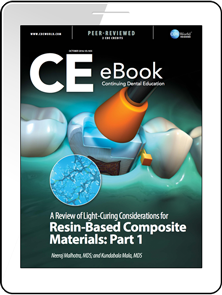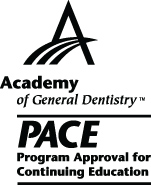CDEWorld > eBooks > A Review of Light-Curing Considerations for Resin-Based Composite Materials: Part 1


ADA CERP is a service of the American Dental Association to assist dental professionals in identifying quality providers of continuing dental education. ADA CERP does not approve or endorse individual courses or instructors, nor does it imply acceptance of credit house by boards of dentistry. Concerns or complaints about a CE provider may be directed to the provider or to ADA CERP at www.ada.org/cerp/

Approved PACE Program Provider. FAGD/MAGD credit. Approval does not imply acceptance by a state or provincial board of dentistry, or AGD endorsement. 1/1/2023 to 12/31/2028. ID # 209722.
eBook
Released: Monday, October 3, 2016
Expires: Saturday, September 30, 2017
A Review of Light-Curing Considerations for Resin-Based Composite Materials: Part 1
By Neeraj Malhotra, MDS; and Kundabala Mala, MDS
Commercial Supporter: Shofu
There has been a continual advent of improved technologies in dentistry. Among these are the material sciences of resin-based composites (RBCs). Since the introduction of light-cured RBCs, the problem of polymerization shrinkage and the methods used to overcome this have concerned clinicians and researchers. Types of curing light and modes of curing have been shown to affect the degree of polymerization and related shrinkage of RBCs. This review, which is divided into two parts, discusses the contemporary light-curing units. Part I explores the evolution in light-curing units and different curing modes. Part II highlights the clinical considerations regarding light curing of RBCs that are important for achieving optimal curing and maximum polymerization of RBCs in a clinical setting.
LEARNING OBJECTIVES:
-
Summarize the evolution of light-curing units for resin-based composites. Explain how CBCT is used for implant treatment planning
-
Discuss the advantages and disadvantages of various lightcuring devices
-
Explain various light-curing modes
About the Authors
Neeraj Malhotra, MDS
Assistant Professor, Department of Conservative Dentistry and Endodontics, Manipal College of Dental Sciences, Mangalore, India
Kundabala Mala, MDS
Professor, Department of Conservative Dentistry and Endodontics, Manipal College of Dental Sciences, Mangalore, India


